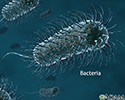Anaerobic bacteria
AnaerobeAnaerobic bacteria are bacteria that do not live or grow when oxygen is present.
In humans, these bacteria are most commonly found in the gastrointestinal tract. They play a role in conditions such as appendicitis, diverticulitis, and perforation of the bowel.
Appendicitis
Appendicitis is a condition in which your appendix gets inflamed. The appendix is a small pouch attached to the end of the large intestine.

Diverticulitis
Diverticula are small, bulging sacs or pouches that form on the inner wall of the intestine. Diverticulitis occurs when these pouches become inflame...

Perforation of the bowel
A perforation is a hole that develops through the wall of a body organ. This problem may occur in the esophagus, stomach, small intestine, large int...

References
Murray PR, Rosenthal KS, Pfaller MA. Non-spore-forming anaerobic bacteria. In: Murray PR, Rosenthal KS, Pfaller MA, eds. Medical Microbiology. 9th ed. Philadelphia, PA: Elsevier; 2021:chap 31.
Patel R, Fraser VJ. Introduction to microbial disease: pathophysiology and diagnostics. In: Goldman L, Cooney KA, eds. Goldman Cecil Medicine. 27th ed. Philadelphia, PA: Elsevier; 2024:chap 256.
Review Date: 4/1/2025
Reviewed By: Linda J. Vorvick, MD, Clinical Professor Emeritus, Department of Family Medicine, UW Medicine, School of Medicine, University of Washington, Seattle, WA. Also reviewed by David C. Dugdale, MD, Medical Director, Brenda Conaway, Editorial Director, and the A.D.A.M. Editorial team.


